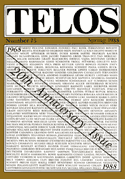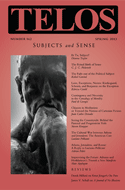By Daniel Wong · Friday, June 21, 2013 The following paper was presented at the Seventh Annual Telos Conference, held on February 15–17, 2013, in New York City.
 Flush with optimism following the end of the Cold War, many American and European scholars openly speculated about the possibilities of a Kantian perpetual peace, returning with renewed vigor to theories of cosmopolitanism. As Amanda Anderson has put it, such cosmopolitanism “endorses reflective distance from one’s cultural affiliations, a broad understanding of other cultures and customs, and a belief in universal humanity.” Indeed, recent developments in communication technology, combined with a proliferation of transnational migrations, have made it possible to truly imagine and experience “navigating beyond one’s state.” Flush with optimism following the end of the Cold War, many American and European scholars openly speculated about the possibilities of a Kantian perpetual peace, returning with renewed vigor to theories of cosmopolitanism. As Amanda Anderson has put it, such cosmopolitanism “endorses reflective distance from one’s cultural affiliations, a broad understanding of other cultures and customs, and a belief in universal humanity.” Indeed, recent developments in communication technology, combined with a proliferation of transnational migrations, have made it possible to truly imagine and experience “navigating beyond one’s state.”
Continue reading →
By Telos Press · Monday, June 17, 2013 The Difficulty of Democracy: Diagnoses and Prognoses
February 14–16, 2014
New York
In spite of its advantages as an ideal form of government, democracy has proven to be remarkably difficult to establish and to maintain in reality. While it remained a rare exception for much of human history, its spread in the modern world has not had the character of a triumphant march but rather of a tortured path dominated by failed attempts, transformations into dictatorship, and degenerations into civil war. Even the most successful cases, Great Britain, France, and the United States, were marked by a concurrence of the rise of democratic institutions with an imperialist expansion that created a de facto hierarchy of citizens and non-citizens familiar also in ancient Athens. The purpose of the Eighth Annual Telos conference will be to analyze the key characteristics of democracy in order to determine, first, the precise advantages and disadvantages of this form of government in comparison to alternatives, second, the reasons for its rarity and volatility, and, third, the factors that are essential for its stability. We welcome paper submissions that address issues such as classical and modern theories of democracy, case studies of successful or failed democracies around the world, antinomies and conflicts within established democracies, revolutionary movements as progenitors of democracy, degeneration of democracies into other forms of government, the importance of culture and representation for founding and maintaining democracy, and the economic requirements and consequences of democracy. Please send an abstract and short c.v. to dtpan@uci.edu by August 31, 2013.
Continue reading →
By Michael Barnes Norton · Friday, June 14, 2013 The following paper was presented at the Seventh Annual Telos Conference, held on February 15–17, 2013, in New York City.
 Despite the modern investment in the secularization of the political realm, religious discourse and concepts continue to inhabit it both explicitly and implicitly. Indeed, it should perhaps by now go without saying that the very idea of secularization or secularity has itself never been free of certain religious or theological determinations. This fact continues to present one of the most striking challenges to the very project of secularization, but alongside this, and of a piece with it, there have recently emerged with ever greater frequency and visibility examples of what we can understand as a breakdown in the basic functionality of religious discourse itself. On the one hand, those of us who wish to remain “tolerant” often experience nearly paralyzing reservations about speaking religiously in public contexts; on the other hand, there are those who exhibit a rash willingness to bring religious vocabulary into any discussion and even to oppose speech that does not employ such vocabulary solely based on this lack. Despite the modern investment in the secularization of the political realm, religious discourse and concepts continue to inhabit it both explicitly and implicitly. Indeed, it should perhaps by now go without saying that the very idea of secularization or secularity has itself never been free of certain religious or theological determinations. This fact continues to present one of the most striking challenges to the very project of secularization, but alongside this, and of a piece with it, there have recently emerged with ever greater frequency and visibility examples of what we can understand as a breakdown in the basic functionality of religious discourse itself. On the one hand, those of us who wish to remain “tolerant” often experience nearly paralyzing reservations about speaking religiously in public contexts; on the other hand, there are those who exhibit a rash willingness to bring religious vocabulary into any discussion and even to oppose speech that does not employ such vocabulary solely based on this lack.
Continue reading →
By Robert Wyllie · Tuesday, June 11, 2013 As an occasional feature on TELOSscope, we highlight a past Telos article whose critical insights continue to illuminate our thinking and challenge our assumptions. Today, Robert Wyllie looks at Luciano Pellicani’s “Weber and the Myth of Calvinism,” from Telos 75 (Spring 1988).
 In his exchange with Adrian Pabst in Telos 162, Luciano Pellicani argues that the United States’ constitutional founding comes “in clear opposition to the theocratic model of the Puritan Fathers” (160). The Founding Fathers’ radical commitment to the Enlightenment, Pellicani claims, was the opening salvo in the contemporary culture war still raging in America. On one side there has always been the “commercial society ruled by a wealthy bourgeoisie” (155) aligned with the Enlightenment critique of religion (the deism of Paine and Jefferson) behind a secular constitution. On the other side is a populist religious opposition to the Constitution. The medieval and theocratic spirit of the Puritans, Pellicani explains, runs through the eighteenth-century Great Awakening all the way to the modern Christian Coalition. Pabst’s counter-argument proposes that Pellicani’s argument “is all too Protestant in its divorce of rationality from belief” (171). According to Pabst, Calvinism contributed decisively to the secularization of European society and the growth of North American capitalism (166). Pellicani’s hostility to this thesis has a long history in the pages of Telos. In his exchange with Adrian Pabst in Telos 162, Luciano Pellicani argues that the United States’ constitutional founding comes “in clear opposition to the theocratic model of the Puritan Fathers” (160). The Founding Fathers’ radical commitment to the Enlightenment, Pellicani claims, was the opening salvo in the contemporary culture war still raging in America. On one side there has always been the “commercial society ruled by a wealthy bourgeoisie” (155) aligned with the Enlightenment critique of religion (the deism of Paine and Jefferson) behind a secular constitution. On the other side is a populist religious opposition to the Constitution. The medieval and theocratic spirit of the Puritans, Pellicani explains, runs through the eighteenth-century Great Awakening all the way to the modern Christian Coalition. Pabst’s counter-argument proposes that Pellicani’s argument “is all too Protestant in its divorce of rationality from belief” (171). According to Pabst, Calvinism contributed decisively to the secularization of European society and the growth of North American capitalism (166). Pellicani’s hostility to this thesis has a long history in the pages of Telos.
Continue reading →
By Telos Press · Monday, June 10, 2013 Telos editor Russell A. Berman has received the Lloyd W. Dinkelspiel Award for Distinctive Contributions to Undergraduate Education at Stanford University. This award, named after the president of the Board of Trustees who served from 1953 to 1958, recognizes distinctive contributions to undergraduate education or to the quality of student life.
Berman is the Walter A. Haas Professor in the Humanities at Stanford University, a professor of comparative literature and German Studies, and a senior fellow at the Hoover Institution. He was honored “for more than three decades of excellence as a teacher and scholar at Stanford and as a national voice, working to re-envision humanities education in this time of transition.”
Continue reading →
By Adrian Pabst · Wednesday, May 29, 2013 Adrian Pabst’s “Athens, Jerusalem, and Rome: A Reply to Luciano Pellicani” appears in Telos 162 (Spring 2013). Read the full version online at the Telos Online website, or purchase a print copy of the issue in our store.
 According to Luciano Pellicani, the U.S. culture wars are grounded in a perpetual struggle between the enlightening forces of reason and democracy, on the one hand, and the dark forces of faith and theocracy, on the other hand. Accordingly, he claims that the Puritans sought to establish a medieval collectivist theocracy, not a modern market democracy, and that the U.S. “culture war” between enlightened secular liberalism and reactionary religious conservatism ultimately rests on the perpetual battle between Athenian reason and the faith of Jerusalem. According to Luciano Pellicani, the U.S. culture wars are grounded in a perpetual struggle between the enlightening forces of reason and democracy, on the one hand, and the dark forces of faith and theocracy, on the other hand. Accordingly, he claims that the Puritans sought to establish a medieval collectivist theocracy, not a modern market democracy, and that the U.S. “culture war” between enlightened secular liberalism and reactionary religious conservatism ultimately rests on the perpetual battle between Athenian reason and the faith of Jerusalem.
Continue reading →
|
|
 Flush with optimism following the end of the Cold War, many American and European scholars openly speculated about the possibilities of a Kantian perpetual peace, returning with renewed vigor to theories of cosmopolitanism. As Amanda Anderson has put it, such cosmopolitanism “endorses reflective distance from one’s cultural affiliations, a broad understanding of other cultures and customs, and a belief in universal humanity.” Indeed, recent developments in communication technology, combined with a proliferation of transnational migrations, have made it possible to truly imagine and experience “navigating beyond one’s state.”
Flush with optimism following the end of the Cold War, many American and European scholars openly speculated about the possibilities of a Kantian perpetual peace, returning with renewed vigor to theories of cosmopolitanism. As Amanda Anderson has put it, such cosmopolitanism “endorses reflective distance from one’s cultural affiliations, a broad understanding of other cultures and customs, and a belief in universal humanity.” Indeed, recent developments in communication technology, combined with a proliferation of transnational migrations, have made it possible to truly imagine and experience “navigating beyond one’s state.”  In his exchange with Adrian Pabst in
In his exchange with Adrian Pabst in  According to
According to 

